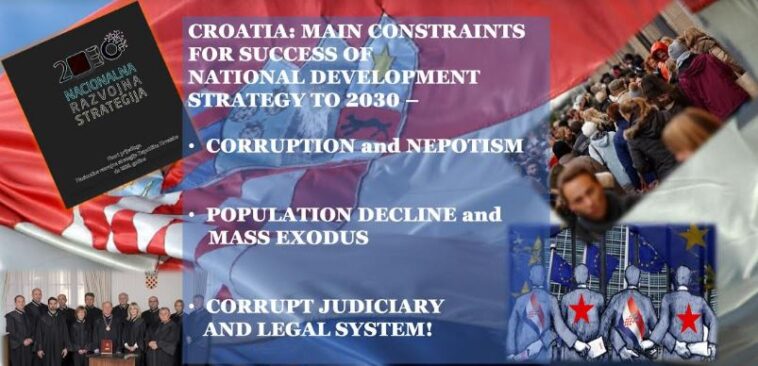Pretending to reinvent “sliced bread” all over again would be among the characteristics of a political environment where working on national goals is set aside throughout decades for personal gains of politicians while the country descends into economic chaos, political swamp and living standards depletion for the masses.
Current minority government in Croatia has during the past weeks been boasting of its Croatia 2030 National Development Strategy (NDS) as being the first in history of modern Croatia that for its success uses or depends on participatory and bottom-up approach to finally get Croatia where it should be: prosperous and democratic. The implementation of such plan is heavily dependent on EU funds and given that the widespread corruption at all levels (local and national), particularly public administration and judiciary, in Croatia has not been systematically dealt with one does fret for the success of such a plan that involves participation of the heavily corrupt network.
One thing is certain: without significant and “cut-throat” reforms in Croatia, without decommunising Croatia, no amount of EU or other international funds injected into Croatia will help towards the achievement of this NDS. While this NDS could be seen as an opportunity for a new start the foundations upon which the Plan is hitting the ground running are rotten. Too much corruption and nepotism everywhere.
What a shame the government keeps ignoring the fact that, although in skeleton form, Croatia’s national development strategic plan was actually devised during the Homeland War, announced in Dr Franjo Tudjman’s speech at the inauguration of the Croatian Parliament on 30 May 1990, when he said: “…At the end of this inaugural address, allow me to endeavour and put forward, in the briefest of points, some of the most urgent and immediate tasks that stand before the new democratic government of Croatia…”
Released late January 2021 https://hrvatska2030.hr/ by the government for parliamentary discussions, under the banner “Croatia 2030”, the 2030 National Development Strategy should steer the development of Croatia until 2030. While broad vision documents were produced by past governments in Croatia, this is the first time that the Government has decided to employ a comprehensive and evidence-based process using a participatory and bottom-up approach. Not unlike the crumbled Communist Yugoslavia used to do in its Five or Ten-Year Plans by the way. Glossy plans through which the communist elites of Yugoslavia got richer and ordinary people poorer and hungrier. Because no changes were made to stamp out corruption and political persecution of those not towing the communist line. Similar environment exists in Croatia today, hence mass exodus of young people during the past decade and thriving corruption is “king”.
The principal role of the World Bank in the process of the preparation of the 2030 NDS has been to provide analytical support. World Bank policy notes aimed to help the authorities recognise the most binding development gaps, define the reform and investment priorities for the country based on the vision and strategic objectives that were set by the Ministry of Regional Development and EU Funds, and identify actions needed to bring the country closer to its 2030 targets.
Prime Minister Andrej Plenkovic said in Croatian Parliament on January 27: “We welcome all Members of Parliament to participate in the debate and hope to reach a consensus on this document today,” reiterating that ten years from now he saw Croatia as a competitive, innovative and safe country of recognisable identity and culture, with preserved resources, good living standards and equal opportunities for all.
The Prime Minister listed the goals to be achieved by 2030. Among them are raising GDP per capita to 75 percent of the EU average, and the share of exports of goods and services from 52 to 70 percent of GDP, significant acceleration of the work of the judiciary, reaching the OECD average, raising the coverage of children in kindergartens above 97 percent and employment to 75 percent, reducing the share of people at risk of poverty, extending the expected number of years of healthy living by six to eight years.
There certainly was no consensus reached in parliament on that day as the MPs in government showered the plan with accolades like ambitious but real and the opposition MPs described it as unambitious, insufficiently clear, coming too late and offering no vision.
Opposition MP Hrvoje Zekanovic (Hrvatski Suverenisti/Croatian Sovereignists), said for the Plan document that it is at the level of High School graduation work and maintains all the woes and misery of Croatian politics, hoping that it will not in the future.
Opposition MP Miroslav Skoro (Domovinski Pokret/Homeland Movement) said that the economy is not in focus in this Plan, because the country is run by people from diplomacy who have never worked in the real sector and do not really know how the economy works. We must create conditions for growth and development, said Skoro, adding that the strategy must give hope for a better future, a vision and help in its realisation.
On Friday 5th February, the Croatian Parliament finally voted on the National Development Strategy of Croatia until 2030. 77 deputies voted for the Croatian National Strategy, 59 were against, 2 abstained. Not a landscape that inspires faith and optimism that this NDS will actually achieve its goals. One must wonder whether that is because the Strategy itself does not enter into the essential pre-requisites for any strategy to succeed? For Croatia that would be decommunisation of public administration aiming at fierce and intense stamping out of corruption and nepotism.
National Development Strategies worldwide exist to set a clear long-term vision for the country providing a strategic guidance to all development policies and lower-ranking strategic planning documents. Additionally, the analytical underpinning prepared for the NDS and the extensive consultation process to prepare the NDS for Croatia chiefly by a team of consultants under the World Bank umbrella has cost Croatian taxpayers 32 million kunas or 4.2 million euro!
In its introductory part of its National Development Strategy 2030 Croatian government mentions absolutely nothing of the strategy or plan laid out at the start of secession from communist Yugoslavia and during the Homeland War that actually made possible today’s Croatia. This may well mean that the government aims to further degrade the foundation upon which today’s democracy was won in rivers of blood, amidst Serb aggression, devastation and despair for freedom from communism. Here is what the introduction to the NDS says (PDF):
“In an increasingly globalised world, marked by challenges like the fourth industrial revolution and green transitions, but also numerous threats, such as climate changes, pandemics, geopolitical disturbances or migrations, planning for the future today is perhaps more important than ever before. In this regard, timely recognition of trends, their own strengths and weaknesses are key to turning challenges and new opportunities into development opportunities, but also to strengthen society’s resilience and its greater readiness to deal with the unpredictable circumstances.
To adapt to all these challenges and to exploit all its potentials, to be able to to coordinate the efforts of all public policies, Croatia should already today have a clear vision of its future development and define the goals it wants to achieve by 2030. In addition, as a member of the European Union, Croatia has generous European funds at its disposal, which will be an important lever in achieving those goals. This requires a clear framework and quality multi-year planning, so that the benefits of EU membership can be better exploited…”
Croatia suffers from a number of constraints for its development as set out in the NDS framework and these are:
Corruption in many different sectors of economy. Corruption comes in many forms, including the theft of public funds by politicians and government employees, and the theft and misuse of overseas aid, nepotism within the employment sector. Bribery is also a persistent threat and tends to involve the issuing of government contracts. In former communist Yugoslavia, bribery was the norm, and Croatia had inherited this, had not even seriously attempted to stamp it out and this seriously weakens the operation of strategies towards betterment of the nation.
Population is a considerable constraint on economic growth and Croatia’s declining population either due to mass exodus/emigration, relatively low birth rate and inefficiently stimulating climate for the return of Croats living in the diaspora means Croatia is in serious trouble achieving its planned goals or strategies unless significant reforms are undertaken in this field.
Absence of a developed, independent and corruption-fee legal and judiciary system in Croatia has been an eyesore for many over the decades, yet nothing much changes and justice for ordinary citizens depends on the political agenda of courts and judges, even many practicing lawyers.
Given the past and the existing practices in Croatia which at high levels of authority still celebrate the failed communist Yugoslavia laws and public administration immorality there is a real danger that funds coughed up by the EU for this NDS will significantly dissipate into corrupt practices (pockets) and the NDS will, therefore, not be worth the paper it’s written on. I may be proven wrong; however, my assessment and sentiment are shared by many, including parliamentary votes regarding the NDS. To ensure success of such an NDS a political force is needed that would preserve the values of Croatian national identity away from communist past. Positive identity generates pride and pride generates positive energy capable of achieving just about anything put in front of it. Ina Vukic




